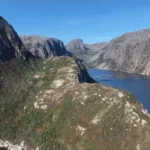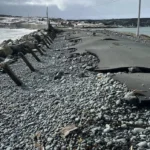[ad_1]

Bundit Pantarakon, an area businessman and metropolis council member in Mae Sai, Thailand, appears to be like over the Sai River.
Michael Sullivan/NPR
conceal caption
toggle caption
Michael Sullivan/NPR
THA TON, Thailand — The Wat Tha Ton Temple sits excessive above the vacationer city of Tha Ton, with an impressive view of the Kok River valley to the south and an equally spectacular view of the river winding its manner out of the mountains of Myanmar from the north. Prasert Guytuan, an area college employee, says folks right here first began noticing an issue with the river about two years in the past, when a mine simply throughout the border in Myanmar began manufacturing and the water obtained somewhat murky and itchy. Nevertheless it wasn’t too unhealthy, he says, till this February, when the water did not clear because it usually would in the course of the dry season.
“Previously, the river was central to village life. When it cleared, folks would come down to wash in it and use it for cleansing and different issues. However after folks began getting pores and skin rashes, we realized it was unsafe, and folks began avoiding it,” Guytuan says.
That is when the Division of Air pollution Management began testing the water, and located arsenic ranges practically 4 occasions the World Well being Group (WHO) limits, and unsafe ranges of different hazardous metals, in a river that flows some 150 miles by Thailand’s Chiang Rai province earlier than emptying into Southeast Asia’s largest and longest river, the Mekong — the place unsafe ranges of arsenic had been additionally detected earlier this month. Pianporn Deetes is the regional marketing campaign director for the NGO Worldwide Rivers.
“It is not protected anymore. And that is the water supply that individuals are utilizing for irrigation, for farming, for fishing and for his or her cultural actions,” Pianporn says.
Pianporn and different activists blame unregulated gold and uncommon earth mining in Myanmar’s neighboring Shan state for the transborder air pollution. Uncommon earth minerals are vital parts for manufacturing in planes, electrical autos, smartphones, even army plane. The overwhelming majority of their manufacturing is managed by China, and the world’s insatiable urge for food for uncommon earths has led to a increase in unregulated mining in neighboring Myanmar. And it is not simply the Kok River that is been affected.

The Kok River and its valley, seen from the Wat Tha Ton Temple.
Michael Sullivan/NPR
conceal caption
toggle caption
Michael Sullivan/NPR
Bundit Pantarakon is an area businessman and metropolis council member in Mae Sai, about 60 miles northeast of Tha Ton on the Sai River which kinds the border between Thailand and Myanmar.
“There are three mines closest to us. The closest one might be 10 kilometers upstream, then one other about 20 kilometers and the furthest round 40. You possibly can see them on google earth. They usually use the Sai River itself to scrub all the things away,” Bundit says.
Bundit additionally leads a group flood aid staff in Mae Sai, and reveals a rash on his hand he obtained whereas rescuing folks from flooding a number of weeks in the past — a rash he blames on poisonous metals within the water. After the flooding in Might, the native authorities examined the effectively water in six homes alongside the river, he says. All however one had arsenic ranges effectively above the WHO restrict. Each the Sai and the Kok rivers circulation into the Mekong, as does the Ruak, the place unsafe ranges of arsenic have additionally been discovered. Residents have been warned to not use the water from the rivers. Even elephant camps — a giant vacationer draw — will not let their animals bathe in it, both.
“That is simply the primary chapter of the catastrophe that is going to occur to the folks, inhabitants alongside the Kok, alongside the Sai River and alongside the Mekong,” Pianporn Deetes, from Worldwide Rivers, says. She says the continued civil struggle in neighboring Myanmar has solely exacerbated the issue.

“That is probably the most unreported main situation within the Mekong taking place now. And it is taking place upstream in Myanmar the place there is no governance,” says Brian Eyler, who heads the Southeast Asia program on the Stimson Middle in Washington, D.C.
“That is just like the Wild West in the USA when you would go and mine anyplace with none regulation and pollute as a lot as you need. And there is no one to cease them,” he says, “and I do not know the way it can finish.”
That is as a result of the world in query is managed by the United Wa State Military (UWSA), a closely armed ethnic militia with longstanding hyperlinks to drug trafficking, arms trafficking and different illicit actions. In battle ridden Myanmar, the us have carved out an autonomous enclave full with their very own authorities, armed and supported by neighboring China. The united states declined remark for this story, whilst latest maps from the Shan Human Rights Basis present a pointy uptick within the variety of new mines prior to now a number of years. David Merriman leads the uncommon earths staff on the market intelligence agency Challenge Blue.
“There may be commerce knowledge exhibiting the export of uncommon earth merchandise from Myanmar into China,” Merriman says, “And that is been rising considerably prior to now a number of years however now it appears rather more numerous.”
By some estimates, China now imports roughly half its uncommon earths from Myanmar. Partially, Merriman says, due to Beijing enacting more durable environmental rules at residence in 2015, rules that pushed Chinese language companies to arrange store with native companions subsequent door. The ensuing environmental harm in Myanmar’s northern Kachin state has been effectively documented. In Shan state it is simply starting, although Merriman says China’s involvement in Shan state appears extra restricted.
“Actually, there’s affect and there’s prone to have been some preliminary assist in organising a few of these belongings,” Merriman says, “however it’s not like this can be a Chinese language authorities operation having management over the outputs and such. It’s managed by the us.”

Merriman provides: “China is basically saying look, this isn’t our downside, that is your accountability to function mines how you use in your nation, however we are going to fortunately purchase all of your product. That is actually the state of affairs in a nutshell.”
And that is the half that scares activist Niwat Roykaew probably the most. Niwat lives on the Mekong, about 70 miles south of Mae Sai. Niwat received the 2022 Goldman Environmental Prize for persuading the Thai authorities to scrap plans to permit China to blast a stretch of rapids on the Mekong to permit higher entry for Chinese language cargo ships. He is additionally highlighted the environmental harm attributable to China’s damming of the Mekong, and the issues it is created downstream for tens of tens of millions who depend on the river for his or her livelihoods. However each of these threats, he says, pale compared to the one posed by the unregulated mining.
“Sure, it is a disaster,” Niwat says. “It is a catastrophe. As a result of these are toxins [that get into the water] and so they manifest quickly, and have an effect on not solely people,” he says, “but additionally animals and vegetation and so they get into the meals provide.”
Niwat says China is the one nation with any affect over the us. And he desires Beijing to make use of that affect to finish the mining, or at the least persuade the us to take steps to mitigate the harm it causes by utilizing correct containment methods. It is a tall order, given China’s, and the world’s, insatiable urge for food for uncommon earths. However he says it is the neighborly factor to do, particularly given the good energy competitors between China and the U.S. within the area. To not point out the financial profit, Niwat says, of sustaining pleasant relations with downstream neighbors. He is heartened by a press release from the Chinese language embassy final month that stated it connected “nice significance to the incident of heavy steel contamination” in tributaries of the Mekong River in Thailand, and referred to as for decision by “pleasant dialogue.” Niwat says he is additionally been contacted by the Chinese language consulate to debate the problem. He says that is a begin, however vows to maintain up the stress for one thing extra concrete.
[ad_2]










